My twins Lukas and Castor were born at 34 weeks. I had shown signs of early labour from 28 weeks, so I had been under close care since then. My waters broke at 33 weeks and after a few days’ monitoring I wasn’t very well, my platelets were low, I was severely anaemic and there was a possibility I had HELLP syndrome – a variant of preeclampsia. Also, the smaller twin had a problem with blood flow in the cord so we were recommended to have a c-section that day.
I was living in the Cardiff area, but after my waters broke I had been transferred and admitted to a hospital an hour away from my home. This was five days before my c-section, and I stayed there for three weeks.
The doctors had been honest with us early on that we would be transferred out as their neonatal intensive care unit (NICU) was full and they tried to find us a place as close as possible. But it was horrible being away from my husband and I worried about the additional stress and pressure on him having to travel to see me.
I didn’t get to see the boys when they were born as they were taken straight away. They were both in the NICU to start with and Lukas was generally well, but Castor suffered apnea and glucose tolerance troubles and struggled to move to tube feeding from Total Parenteral Nutrition (TPN), Within five days they were transferred to a high dependency unit (HDU) and then a further week later to the special care baby unit (SCBU). They also both had several photo therapy treatments.
The hardest thing was not seeing them when they were born. I had to wait for hours until I could go and then we had to wait two days for our first cuddles. Even then we were only allowed to hold them once a day, and life on the unit was lonely. Once they were in SCBU we could cuddle them more and were more involved in their care.
Staffing levels seemed OK on the unit, but sometimes there seemed to be only a few doctors available. At other times, we’d be told one thing by doctors and another thing by nurses. This poor communication was quite distressing, as we were already feeling overwhelmed by everything that had happened. I could see that everyone was doing their very best for us, but I could also see that the unit was under a lot of pressure.
The nurses did try to offer me emotional support, but it’s not always easy to talk about your feelings to someone who is very busy and who is also responsible for your babies’ care, and I did feel that I would have liked more support. Sadly, no one at that point told me about Bliss and its work, and as far as I was aware there weren’t any trained mental health workers available for families of babies on the unit. Having an 'independent' person – either a counsellor-type figure or an auxiliary come onto the ward to offer information leaflets, or even just tea and sympathy would have been really welcome – and it could have taken pressure off the busy nurses who were trying not just to care 'bodily' for babies but also look after the emotional wellbeing of mothers and parents.
However, I was able to stay in a parent room after discharge which was great, as it meant I was able to care for my babies day and night. My husband could have stayed too, but he continued working so he could take leave when they were home.
Being able to stay in the hospital helped a lot, as I couldn’t drive – due to the c section – I would have been lost trying to visit them from home. The hospital only had two parent rooms so I am extremely lucky that there was room available for me.
Nevertheless, by the time we got them home I couldn’t wait to just have our family together, it was a busy and worrying time, but was so much easier than being in hospital.
My health visitor told me about Bliss and I started looking on the website and reading the stories and information. If only I had seen this when they were in hospital I would have felt reassured to know that how I was feeling was normal!
Now, thankfully, Lukas and Castor are still under development review and care but seem to be doing very well for their corrected age.
I appreciated the care I got, and I could see the nurses and doctors were doing their best, but I really wish more funding and resources could be made available for neonatal care in Wales.
The nurses and doctors caring for Victoria’s twins did an amazing job, but they are under incredible pressure. Our recent investigation revealed neonatal services in Wales are under strain and facing critical staffing shortages, putting babies at unnecessary risk.
Bliss, together with the Royal College of Paediatrics and Child Health (RCPCH), is calling for urgent action and investment from the Welsh Government to ensure all premature and sick babies born in Wales get the care they need and deserve. Become a Bliss Campaigner here.
